Anglia Ruskin University Stage 1 Research Ethics Application Form
VerifiedAdded on 2020/12/09
|8
|2142
|418
Homework Assignment
AI Summary
This document is a Stage 1 Research Ethics Application Form submitted by a student, likely for a research project at Anglia Ruskin University. The form details the researcher's information, including their department, course, and supervisor. It includes a brief project summary focusing on consumer experience and destination loyalty in the tourism industry, outlining the research's methodology, research questions, and potential value to society and the economy. The application then proceeds to a research ethics checklist, addressing various ethical considerations such as participant involvement, potential risks, and data security. The form also outlines the approval process, risk categories, and confirmation statements regarding research ethics training, data protection, and risk assessments. The student confirms adherence to ethical guidelines and data storage compliance, concluding with submission instructions for supervisors and the relevant ethics committee.
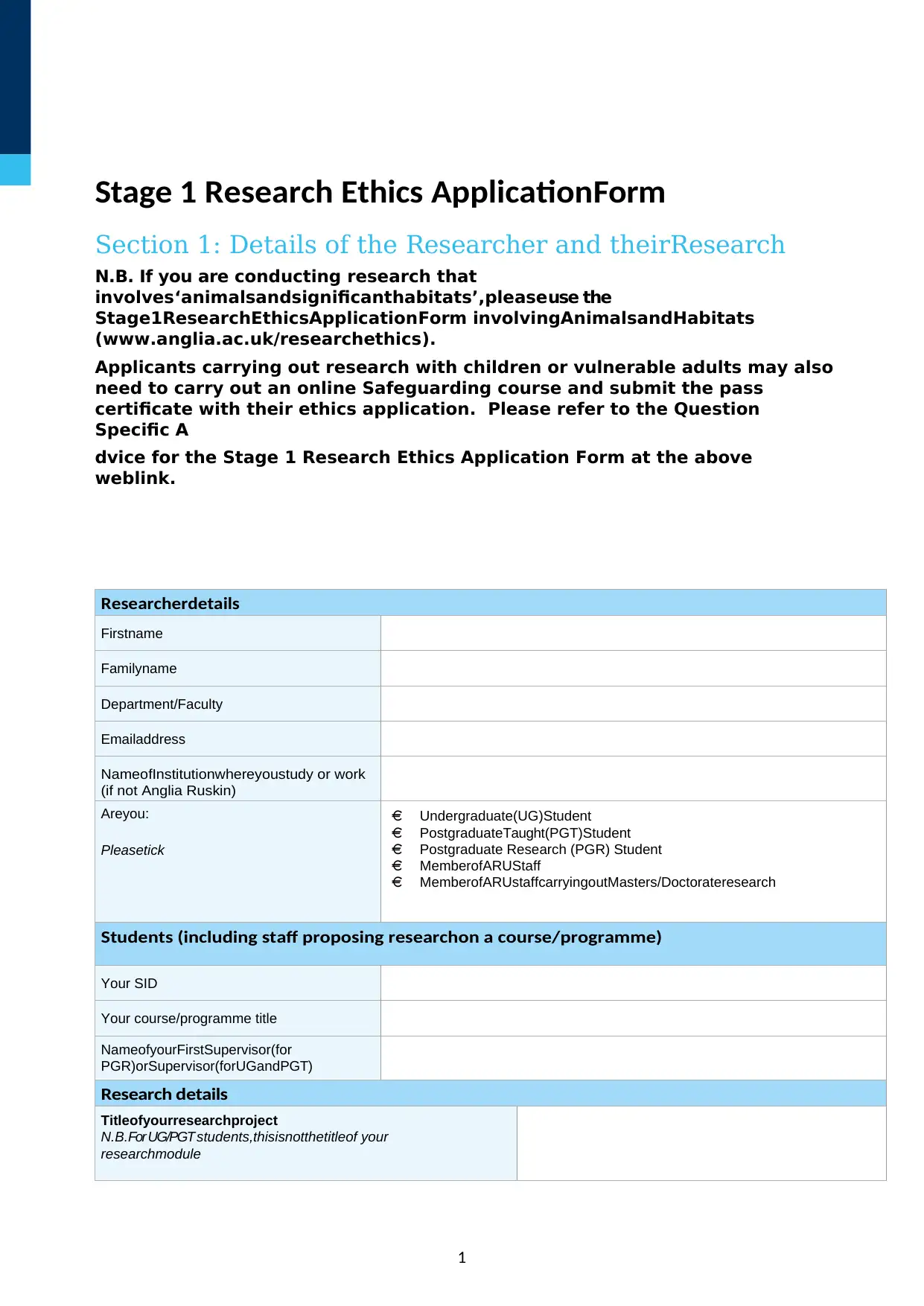
Stage 1 Research Ethics ApplicationForm
Section 1: Details of the Researcher and theirResearch
N.B. If you are conducting research that
involves‘animalsandsignificanthabitats’,pleaseuse the
Stage1ResearchEthicsApplicationForm involvingAnimalsandHabitats
(www.anglia.ac.uk/researchethics).
Applicants carrying out research with children or vulnerable adults may also
need to carry out an online Safeguarding course and submit the pass
certificate with their ethics application. Please refer to the Question
Specific A
dvice for the Stage 1 Research Ethics Application Form at the above
weblink.
Researcherdetails
Firstname
Familyname
Department/Faculty
Emailaddress
NameofInstitutionwhereyoustudy or work
(if not Anglia Ruskin)
Areyou:
Pleasetick
Undergraduate(UG)Student
PostgraduateTaught(PGT)Student
Postgraduate Research (PGR) Student
MemberofARUStaff
MemberofARUstaffcarryingoutMasters/Doctorateresearch
Students (including staff proposing researchon a course/programme)
Your SID
Your course/programme title
NameofyourFirstSupervisor(for
PGR)orSupervisor(forUGandPGT)
Research details
Titleofyourresearchproject
N.B.For UG/PGT students,thisisnotthetitleof your
researchmodule
1
Section 1: Details of the Researcher and theirResearch
N.B. If you are conducting research that
involves‘animalsandsignificanthabitats’,pleaseuse the
Stage1ResearchEthicsApplicationForm involvingAnimalsandHabitats
(www.anglia.ac.uk/researchethics).
Applicants carrying out research with children or vulnerable adults may also
need to carry out an online Safeguarding course and submit the pass
certificate with their ethics application. Please refer to the Question
Specific A
dvice for the Stage 1 Research Ethics Application Form at the above
weblink.
Researcherdetails
Firstname
Familyname
Department/Faculty
Emailaddress
NameofInstitutionwhereyoustudy or work
(if not Anglia Ruskin)
Areyou:
Pleasetick
Undergraduate(UG)Student
PostgraduateTaught(PGT)Student
Postgraduate Research (PGR) Student
MemberofARUStaff
MemberofARUstaffcarryingoutMasters/Doctorateresearch
Students (including staff proposing researchon a course/programme)
Your SID
Your course/programme title
NameofyourFirstSupervisor(for
PGR)orSupervisor(forUGandPGT)
Research details
Titleofyourresearchproject
N.B.For UG/PGT students,thisisnotthetitleof your
researchmodule
1
Paraphrase This Document
Need a fresh take? Get an instant paraphrase of this document with our AI Paraphraser
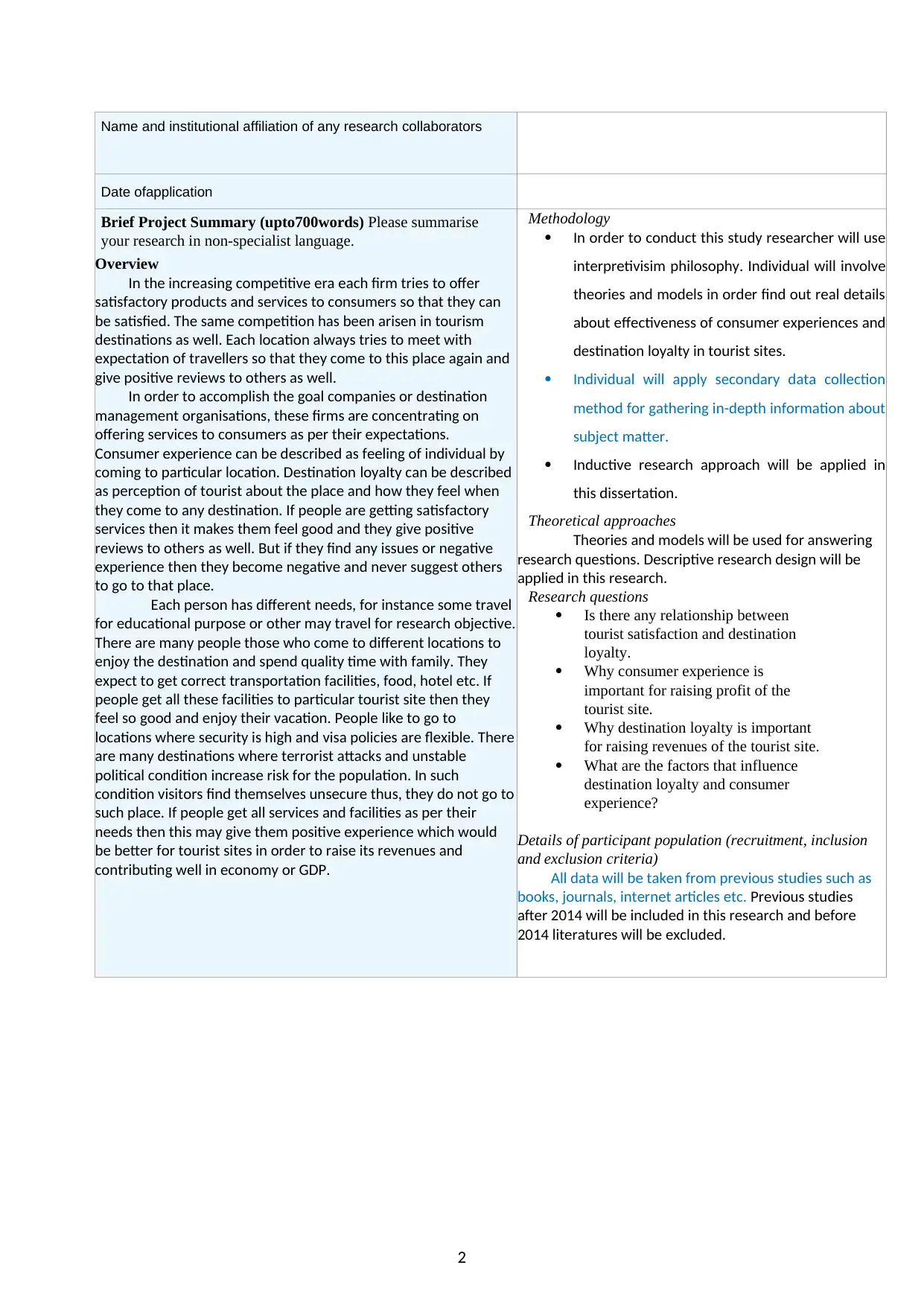
Name and institutional affiliation of any research collaborators
Date ofapplication
Brief Project Summary (upto700words) Please summarise
your research in non-specialist language.
Overview
In the increasing competitive era each firm tries to offer
satisfactory products and services to consumers so that they can
be satisfied. The same competition has been arisen in tourism
destinations as well. Each location always tries to meet with
expectation of travellers so that they come to this place again and
give positive reviews to others as well.
In order to accomplish the goal companies or destination
management organisations, these firms are concentrating on
offering services to consumers as per their expectations.
Consumer experience can be described as feeling of individual by
coming to particular location. Destination loyalty can be described
as perception of tourist about the place and how they feel when
they come to any destination. If people are getting satisfactory
services then it makes them feel good and they give positive
reviews to others as well. But if they find any issues or negative
experience then they become negative and never suggest others
to go to that place.
Each person has different needs, for instance some travel
for educational purpose or other may travel for research objective.
There are many people those who come to different locations to
enjoy the destination and spend quality time with family. They
expect to get correct transportation facilities, food, hotel etc. If
people get all these facilities to particular tourist site then they
feel so good and enjoy their vacation. People like to go to
locations where security is high and visa policies are flexible. There
are many destinations where terrorist attacks and unstable
political condition increase risk for the population. In such
condition visitors find themselves unsecure thus, they do not go to
such place. If people get all services and facilities as per their
needs then this may give them positive experience which would
be better for tourist sites in order to raise its revenues and
contributing well in economy or GDP.
Methodology
In order to conduct this study researcher will use
interpretivisim philosophy. Individual will involve
theories and models in order find out real details
about effectiveness of consumer experiences and
destination loyalty in tourist sites.
Individual will apply secondary data collection
method for gathering in-depth information about
subject matter.
Inductive research approach will be applied in
this dissertation.
Theoretical approaches
Theories and models will be used for answering
research questions. Descriptive research design will be
applied in this research.
Research questions
Is there any relationship between
tourist satisfaction and destination
loyalty.
Why consumer experience is
important for raising profit of the
tourist site.
Why destination loyalty is important
for raising revenues of the tourist site.
What are the factors that influence
destination loyalty and consumer
experience?
Details of participant population (recruitment, inclusion
and exclusion criteria)
All data will be taken from previous studies such as
books, journals, internet articles etc. Previous studies
after 2014 will be included in this research and before
2014 literatures will be excluded.
2
Date ofapplication
Brief Project Summary (upto700words) Please summarise
your research in non-specialist language.
Overview
In the increasing competitive era each firm tries to offer
satisfactory products and services to consumers so that they can
be satisfied. The same competition has been arisen in tourism
destinations as well. Each location always tries to meet with
expectation of travellers so that they come to this place again and
give positive reviews to others as well.
In order to accomplish the goal companies or destination
management organisations, these firms are concentrating on
offering services to consumers as per their expectations.
Consumer experience can be described as feeling of individual by
coming to particular location. Destination loyalty can be described
as perception of tourist about the place and how they feel when
they come to any destination. If people are getting satisfactory
services then it makes them feel good and they give positive
reviews to others as well. But if they find any issues or negative
experience then they become negative and never suggest others
to go to that place.
Each person has different needs, for instance some travel
for educational purpose or other may travel for research objective.
There are many people those who come to different locations to
enjoy the destination and spend quality time with family. They
expect to get correct transportation facilities, food, hotel etc. If
people get all these facilities to particular tourist site then they
feel so good and enjoy their vacation. People like to go to
locations where security is high and visa policies are flexible. There
are many destinations where terrorist attacks and unstable
political condition increase risk for the population. In such
condition visitors find themselves unsecure thus, they do not go to
such place. If people get all services and facilities as per their
needs then this may give them positive experience which would
be better for tourist sites in order to raise its revenues and
contributing well in economy or GDP.
Methodology
In order to conduct this study researcher will use
interpretivisim philosophy. Individual will involve
theories and models in order find out real details
about effectiveness of consumer experiences and
destination loyalty in tourist sites.
Individual will apply secondary data collection
method for gathering in-depth information about
subject matter.
Inductive research approach will be applied in
this dissertation.
Theoretical approaches
Theories and models will be used for answering
research questions. Descriptive research design will be
applied in this research.
Research questions
Is there any relationship between
tourist satisfaction and destination
loyalty.
Why consumer experience is
important for raising profit of the
tourist site.
Why destination loyalty is important
for raising revenues of the tourist site.
What are the factors that influence
destination loyalty and consumer
experience?
Details of participant population (recruitment, inclusion
and exclusion criteria)
All data will be taken from previous studies such as
books, journals, internet articles etc. Previous studies
after 2014 will be included in this research and before
2014 literatures will be excluded.
2
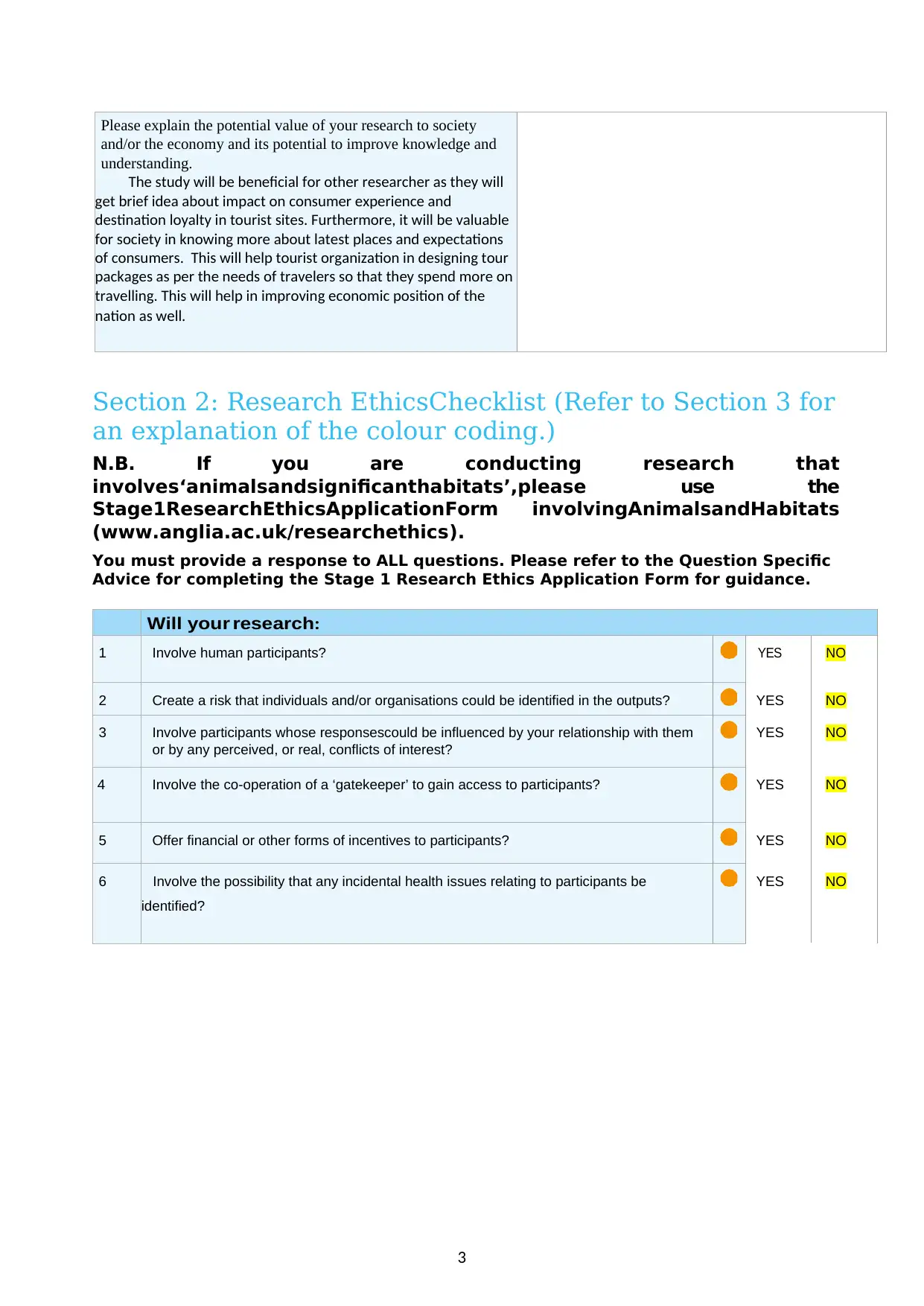
Please explain the potential value of your research to society
and/or the economy and its potential to improve knowledge and
understanding.
The study will be beneficial for other researcher as they will
get brief idea about impact on consumer experience and
destination loyalty in tourist sites. Furthermore, it will be valuable
for society in knowing more about latest places and expectations
of consumers. This will help tourist organization in designing tour
packages as per the needs of travelers so that they spend more on
travelling. This will help in improving economic position of the
nation as well.
Section 2: Research EthicsChecklist (Refer to Section 3 for
an explanation of the colour coding.)
N.B. If you are conducting research that
involves‘animalsandsignificanthabitats’,please use the
Stage1ResearchEthicsApplicationForm involvingAnimalsandHabitats
(www.anglia.ac.uk/researchethics).
You must provide a response to ALL questions. Please refer to the Question Specific
Advice for completing the Stage 1 Research Ethics Application Form for guidance.
Will your research:
1 Involve human participants? YES NO
2 Create a risk that individuals and/or organisations could be identified in the outputs? YES NO
3 Involve participants whose responsescould be influenced by your relationship with them
or by any perceived, or real, conflicts of interest?
YES NO
4 Involve the co-operation of a ‘gatekeeper’ to gain access to participants? YES NO
5 Offer financial or other forms of incentives to participants? YES NO
6 Involve the possibility that any incidental health issues relating to participants be
identified?
YES NO
3
and/or the economy and its potential to improve knowledge and
understanding.
The study will be beneficial for other researcher as they will
get brief idea about impact on consumer experience and
destination loyalty in tourist sites. Furthermore, it will be valuable
for society in knowing more about latest places and expectations
of consumers. This will help tourist organization in designing tour
packages as per the needs of travelers so that they spend more on
travelling. This will help in improving economic position of the
nation as well.
Section 2: Research EthicsChecklist (Refer to Section 3 for
an explanation of the colour coding.)
N.B. If you are conducting research that
involves‘animalsandsignificanthabitats’,please use the
Stage1ResearchEthicsApplicationForm involvingAnimalsandHabitats
(www.anglia.ac.uk/researchethics).
You must provide a response to ALL questions. Please refer to the Question Specific
Advice for completing the Stage 1 Research Ethics Application Form for guidance.
Will your research:
1 Involve human participants? YES NO
2 Create a risk that individuals and/or organisations could be identified in the outputs? YES NO
3 Involve participants whose responsescould be influenced by your relationship with them
or by any perceived, or real, conflicts of interest?
YES NO
4 Involve the co-operation of a ‘gatekeeper’ to gain access to participants? YES NO
5 Offer financial or other forms of incentives to participants? YES NO
6 Involve the possibility that any incidental health issues relating to participants be
identified?
YES NO
3
⊘ This is a preview!⊘
Do you want full access?
Subscribe today to unlock all pages.

Trusted by 1+ million students worldwide
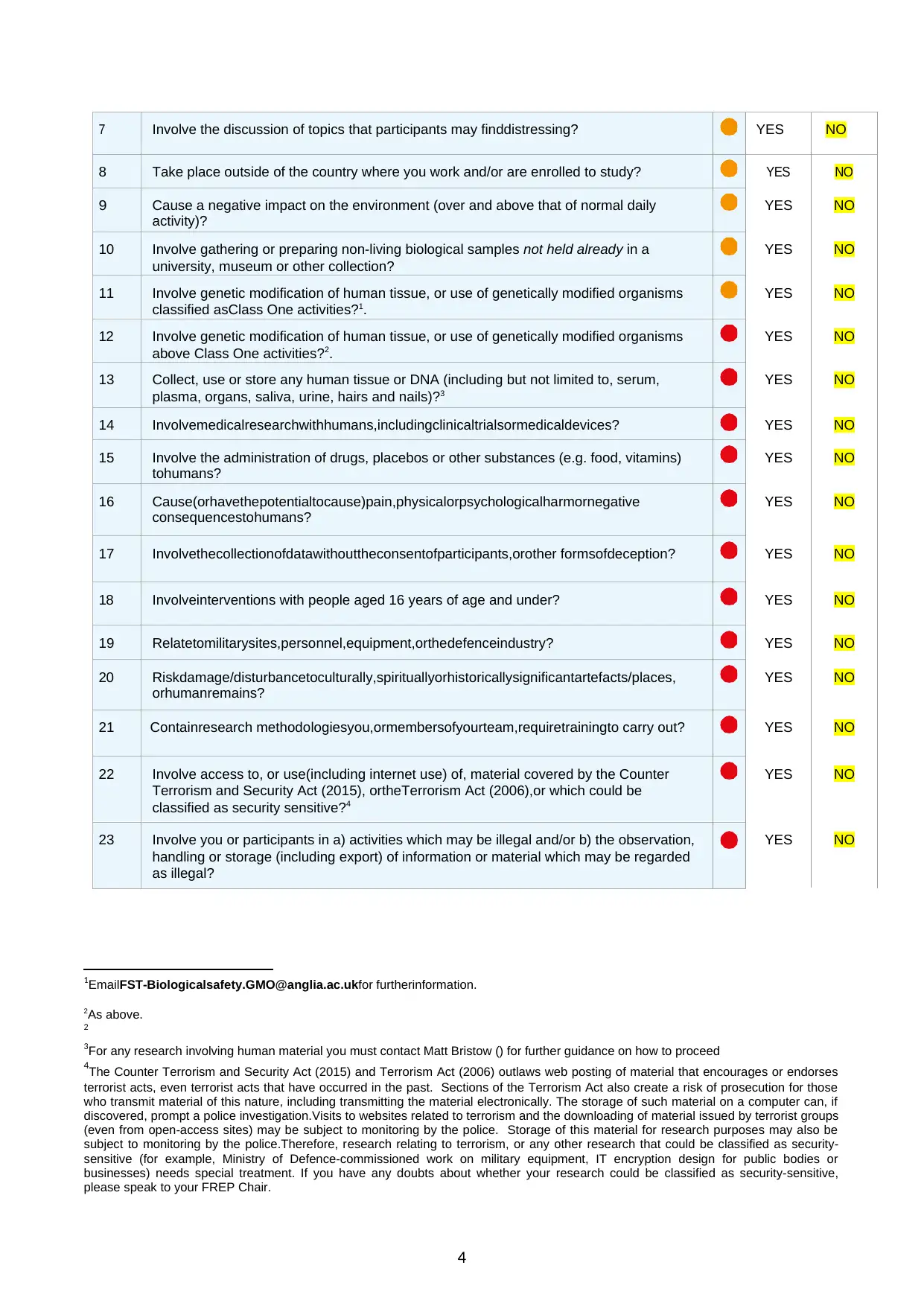
7 Involve the discussion of topics that participants may finddistressing? YES NO
8 Take place outside of the country where you work and/or are enrolled to study? YES NO
9 Cause a negative impact on the environment (over and above that of normal daily
activity)?
YES NO
10 Involve gathering or preparing non-living biological samples not held already in a
university, museum or other collection?
YES NO
11 Involve genetic modification of human tissue, or use of genetically modified organisms
classified asClass One activities?1.
YES NO
12 Involve genetic modification of human tissue, or use of genetically modified organisms
above Class One activities?2.
YES NO
13 Collect, use or store any human tissue or DNA (including but not limited to, serum,
plasma, organs, saliva, urine, hairs and nails)?3
YES NO
14 Involvemedicalresearchwithhumans,includingclinicaltrialsormedicaldevices? YES NO
15 Involve the administration of drugs, placebos or other substances (e.g. food, vitamins)
tohumans?
YES NO
16 Cause(orhavethepotentialtocause)pain,physicalorpsychologicalharmornegative
consequencestohumans?
YES NO
17 Involvethecollectionofdatawithouttheconsentofparticipants,orother formsofdeception? YES NO
18 Involveinterventions with people aged 16 years of age and under? YES NO
19 Relatetomilitarysites,personnel,equipment,orthedefenceindustry? YES NO
20 Riskdamage/disturbancetoculturally,spirituallyorhistoricallysignificantartefacts/places,
orhumanremains?
YES NO
21 Containresearch methodologiesyou,ormembersofyourteam,requiretrainingto carry out? YES NO
22 Involve access to, or use(including internet use) of, material covered by the Counter
Terrorism and Security Act (2015), ortheTerrorism Act (2006),or which could be
classified as security sensitive?4
YES NO
23 Involve you or participants in a) activities which may be illegal and/or b) the observation,
handling or storage (including export) of information or material which may be regarded
as illegal?
YES NO
1EmailFST-Biologicalsafety.GMO@anglia.ac.ukfor furtherinformation.
2As above.
2
3For any research involving human material you must contact Matt Bristow () for further guidance on how to proceed
4The Counter Terrorism and Security Act (2015) and Terrorism Act (2006) outlaws web posting of material that encourages or endorses
terrorist acts, even terrorist acts that have occurred in the past. Sections of the Terrorism Act also create a risk of prosecution for those
who transmit material of this nature, including transmitting the material electronically. The storage of such material on a computer can, if
discovered, prompt a police investigation.Visits to websites related to terrorism and the downloading of material issued by terrorist groups
(even from open-access sites) may be subject to monitoring by the police. Storage of this material for research purposes may also be
subject to monitoring by the police.Therefore, research relating to terrorism, or any other research that could be classified as security-
sensitive (for example, Ministry of Defence-commissioned work on military equipment, IT encryption design for public bodies or
businesses) needs special treatment. If you have any doubts about whether your research could be classified as security-sensitive,
please speak to your FREP Chair.
4
8 Take place outside of the country where you work and/or are enrolled to study? YES NO
9 Cause a negative impact on the environment (over and above that of normal daily
activity)?
YES NO
10 Involve gathering or preparing non-living biological samples not held already in a
university, museum or other collection?
YES NO
11 Involve genetic modification of human tissue, or use of genetically modified organisms
classified asClass One activities?1.
YES NO
12 Involve genetic modification of human tissue, or use of genetically modified organisms
above Class One activities?2.
YES NO
13 Collect, use or store any human tissue or DNA (including but not limited to, serum,
plasma, organs, saliva, urine, hairs and nails)?3
YES NO
14 Involvemedicalresearchwithhumans,includingclinicaltrialsormedicaldevices? YES NO
15 Involve the administration of drugs, placebos or other substances (e.g. food, vitamins)
tohumans?
YES NO
16 Cause(orhavethepotentialtocause)pain,physicalorpsychologicalharmornegative
consequencestohumans?
YES NO
17 Involvethecollectionofdatawithouttheconsentofparticipants,orother formsofdeception? YES NO
18 Involveinterventions with people aged 16 years of age and under? YES NO
19 Relatetomilitarysites,personnel,equipment,orthedefenceindustry? YES NO
20 Riskdamage/disturbancetoculturally,spirituallyorhistoricallysignificantartefacts/places,
orhumanremains?
YES NO
21 Containresearch methodologiesyou,ormembersofyourteam,requiretrainingto carry out? YES NO
22 Involve access to, or use(including internet use) of, material covered by the Counter
Terrorism and Security Act (2015), ortheTerrorism Act (2006),or which could be
classified as security sensitive?4
YES NO
23 Involve you or participants in a) activities which may be illegal and/or b) the observation,
handling or storage (including export) of information or material which may be regarded
as illegal?
YES NO
1EmailFST-Biologicalsafety.GMO@anglia.ac.ukfor furtherinformation.
2As above.
2
3For any research involving human material you must contact Matt Bristow () for further guidance on how to proceed
4The Counter Terrorism and Security Act (2015) and Terrorism Act (2006) outlaws web posting of material that encourages or endorses
terrorist acts, even terrorist acts that have occurred in the past. Sections of the Terrorism Act also create a risk of prosecution for those
who transmit material of this nature, including transmitting the material electronically. The storage of such material on a computer can, if
discovered, prompt a police investigation.Visits to websites related to terrorism and the downloading of material issued by terrorist groups
(even from open-access sites) may be subject to monitoring by the police. Storage of this material for research purposes may also be
subject to monitoring by the police.Therefore, research relating to terrorism, or any other research that could be classified as security-
sensitive (for example, Ministry of Defence-commissioned work on military equipment, IT encryption design for public bodies or
businesses) needs special treatment. If you have any doubts about whether your research could be classified as security-sensitive,
please speak to your FREP Chair.
4
Paraphrase This Document
Need a fresh take? Get an instant paraphrase of this document with our AI Paraphraser
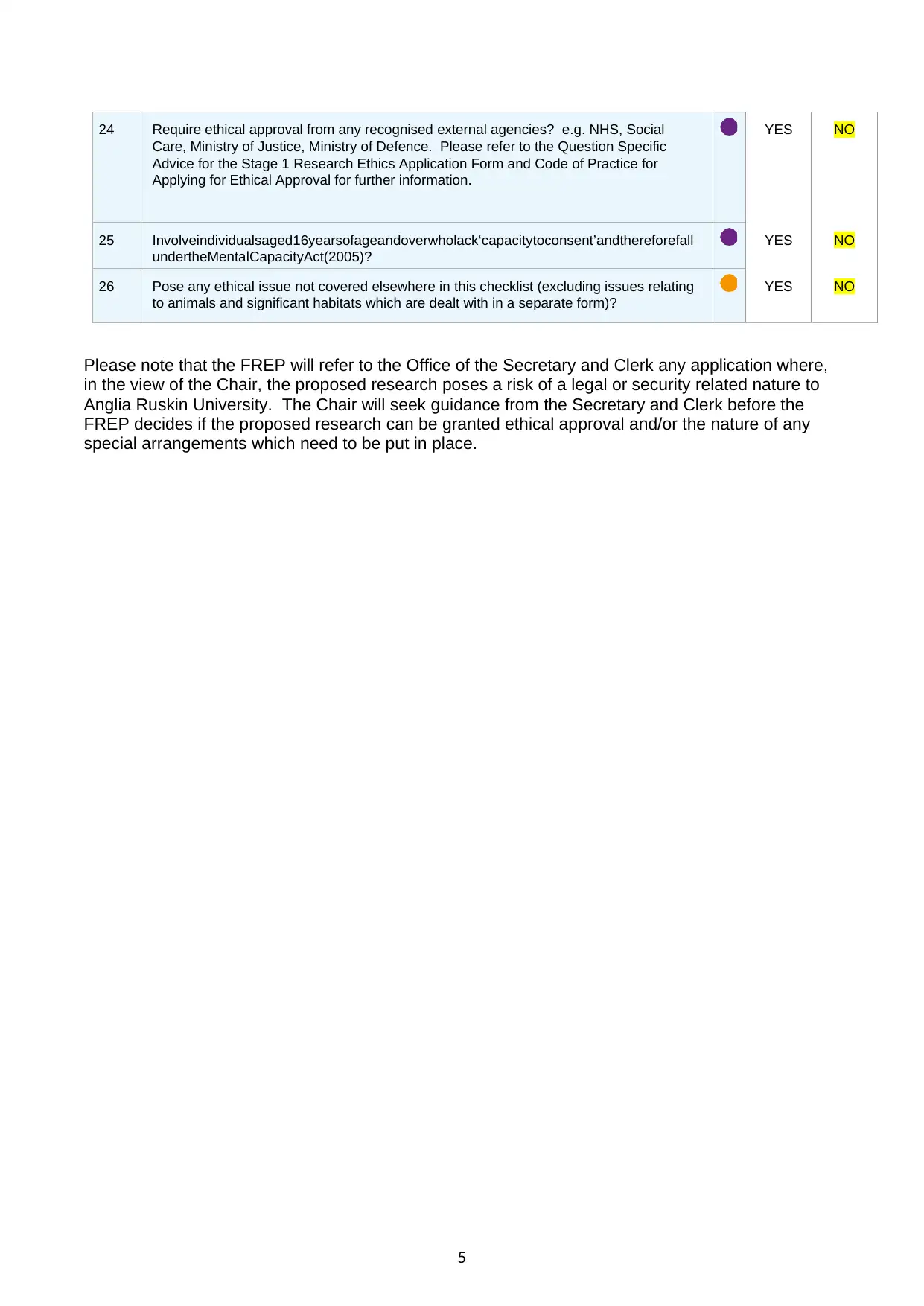
24 Require ethical approval from any recognised external agencies? e.g. NHS, Social
Care, Ministry of Justice, Ministry of Defence. Please refer to the Question Specific
Advice for the Stage 1 Research Ethics Application Form and Code of Practice for
Applying for Ethical Approval for further information.
YES NO
25 Involveindividualsaged16yearsofageandoverwholack‘capacitytoconsent’andthereforefall
undertheMentalCapacityAct(2005)?
YES NO
26 Pose any ethical issue not covered elsewhere in this checklist (excluding issues relating
to animals and significant habitats which are dealt with in a separate form)?
YES NO
Please note that the FREP will refer to the Office of the Secretary and Clerk any application where,
in the view of the Chair, the proposed research poses a risk of a legal or security related nature to
Anglia Ruskin University. The Chair will seek guidance from the Secretary and Clerk before the
FREP decides if the proposed research can be granted ethical approval and/or the nature of any
special arrangements which need to be put in place.
5
Care, Ministry of Justice, Ministry of Defence. Please refer to the Question Specific
Advice for the Stage 1 Research Ethics Application Form and Code of Practice for
Applying for Ethical Approval for further information.
YES NO
25 Involveindividualsaged16yearsofageandoverwholack‘capacitytoconsent’andthereforefall
undertheMentalCapacityAct(2005)?
YES NO
26 Pose any ethical issue not covered elsewhere in this checklist (excluding issues relating
to animals and significant habitats which are dealt with in a separate form)?
YES NO
Please note that the FREP will refer to the Office of the Secretary and Clerk any application where,
in the view of the Chair, the proposed research poses a risk of a legal or security related nature to
Anglia Ruskin University. The Chair will seek guidance from the Secretary and Clerk before the
FREP decides if the proposed research can be granted ethical approval and/or the nature of any
special arrangements which need to be put in place.
5
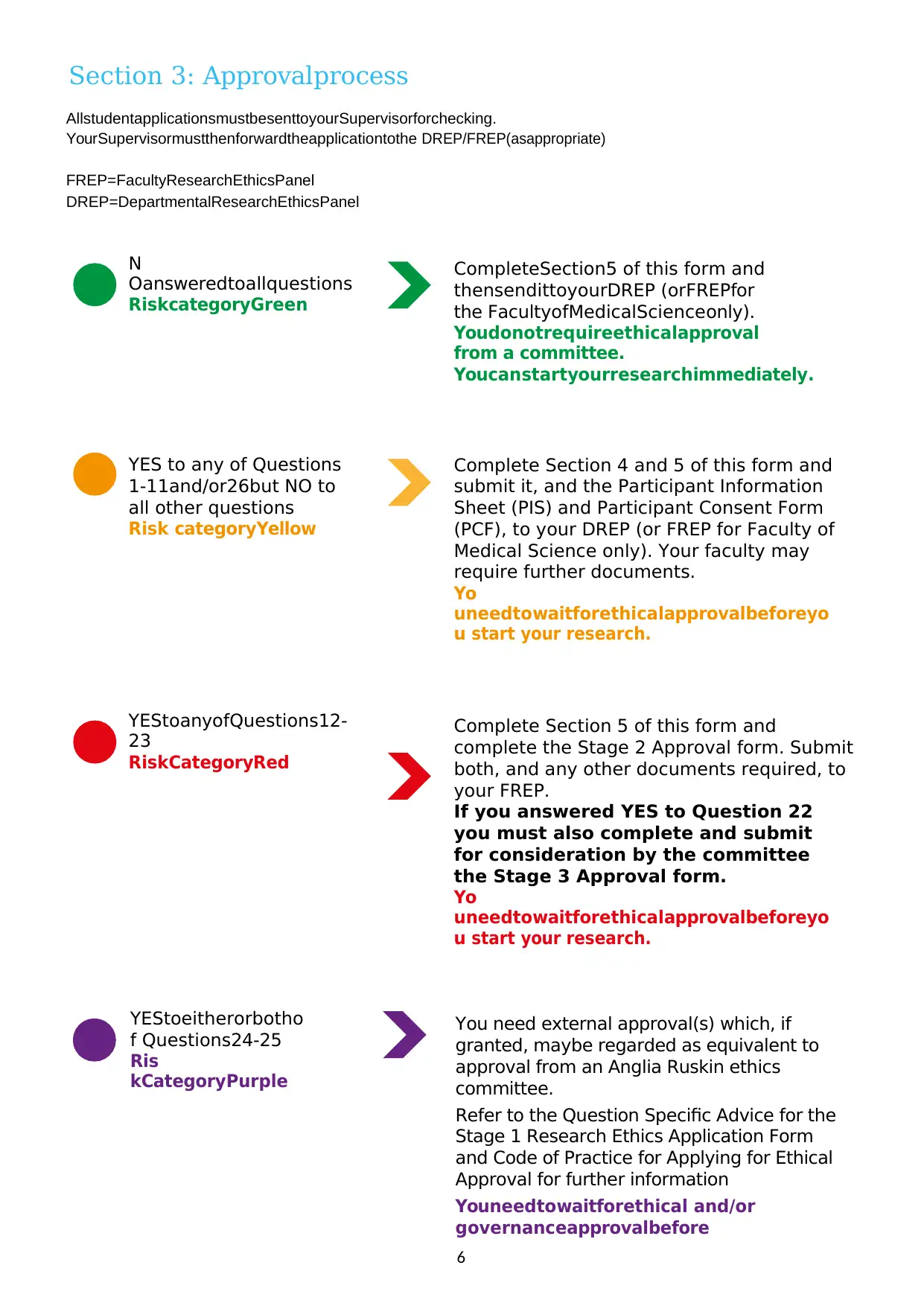
Section 3: Approvalprocess
AllstudentapplicationsmustbesenttoyourSupervisorforchecking.
YourSupervisormustthenforwardtheapplicationtothe DREP/FREP(asappropriate)
FREP=FacultyResearchEthicsPanel
DREP=DepartmentalResearchEthicsPanel
N
Oansweredtoallquestions
RiskcategoryGreen
CompleteSection5 of this form and
thensendittoyourDREP (orFREPfor
the FacultyofMedicalScienceonly).
Youdonotrequireethicalapproval
from a committee.
Youcanstartyourresearchimmediately.
YES to any of Questions
1-11and/or26but NO to
all other questions
Risk categoryYellow
Complete Section 4 and 5 of this form and
submit it, and the Participant Information
Sheet (PIS) and Participant Consent Form
(PCF), to your DREP (or FREP for Faculty of
Medical Science only). Your faculty may
require further documents.
Yo
uneedtowaitforethicalapprovalbeforeyo
u start your research.
YEStoanyofQuestions12-
23
RiskCategoryRed
Complete Section 5 of this form and
complete the Stage 2 Approval form. Submit
both, and any other documents required, to
your FREP.
If you answered YES to Question 22
you must also complete and submit
for consideration by the committee
the Stage 3 Approval form.
Yo
uneedtowaitforethicalapprovalbeforeyo
u start your research.
YEStoeitherorbotho
f Questions24-25
Ris
kCategoryPurple
You need external approval(s) which, if
granted, maybe regarded as equivalent to
approval from an Anglia Ruskin ethics
committee.
Refer to the Question Specific Advice for the
Stage 1 Research Ethics Application Form
and Code of Practice for Applying for Ethical
Approval for further information
Youneedtowaitforethical and/or
governanceapprovalbefore
6
AllstudentapplicationsmustbesenttoyourSupervisorforchecking.
YourSupervisormustthenforwardtheapplicationtothe DREP/FREP(asappropriate)
FREP=FacultyResearchEthicsPanel
DREP=DepartmentalResearchEthicsPanel
N
Oansweredtoallquestions
RiskcategoryGreen
CompleteSection5 of this form and
thensendittoyourDREP (orFREPfor
the FacultyofMedicalScienceonly).
Youdonotrequireethicalapproval
from a committee.
Youcanstartyourresearchimmediately.
YES to any of Questions
1-11and/or26but NO to
all other questions
Risk categoryYellow
Complete Section 4 and 5 of this form and
submit it, and the Participant Information
Sheet (PIS) and Participant Consent Form
(PCF), to your DREP (or FREP for Faculty of
Medical Science only). Your faculty may
require further documents.
Yo
uneedtowaitforethicalapprovalbeforeyo
u start your research.
YEStoanyofQuestions12-
23
RiskCategoryRed
Complete Section 5 of this form and
complete the Stage 2 Approval form. Submit
both, and any other documents required, to
your FREP.
If you answered YES to Question 22
you must also complete and submit
for consideration by the committee
the Stage 3 Approval form.
Yo
uneedtowaitforethicalapprovalbeforeyo
u start your research.
YEStoeitherorbotho
f Questions24-25
Ris
kCategoryPurple
You need external approval(s) which, if
granted, maybe regarded as equivalent to
approval from an Anglia Ruskin ethics
committee.
Refer to the Question Specific Advice for the
Stage 1 Research Ethics Application Form
and Code of Practice for Applying for Ethical
Approval for further information
Youneedtowaitforethical and/or
governanceapprovalbefore
6
⊘ This is a preview!⊘
Do you want full access?
Subscribe today to unlock all pages.

Trusted by 1+ million students worldwide

yo
ustartyourrese
arch.
7
ustartyourrese
arch.
7
Paraphrase This Document
Need a fresh take? Get an instant paraphrase of this document with our AI Paraphraser
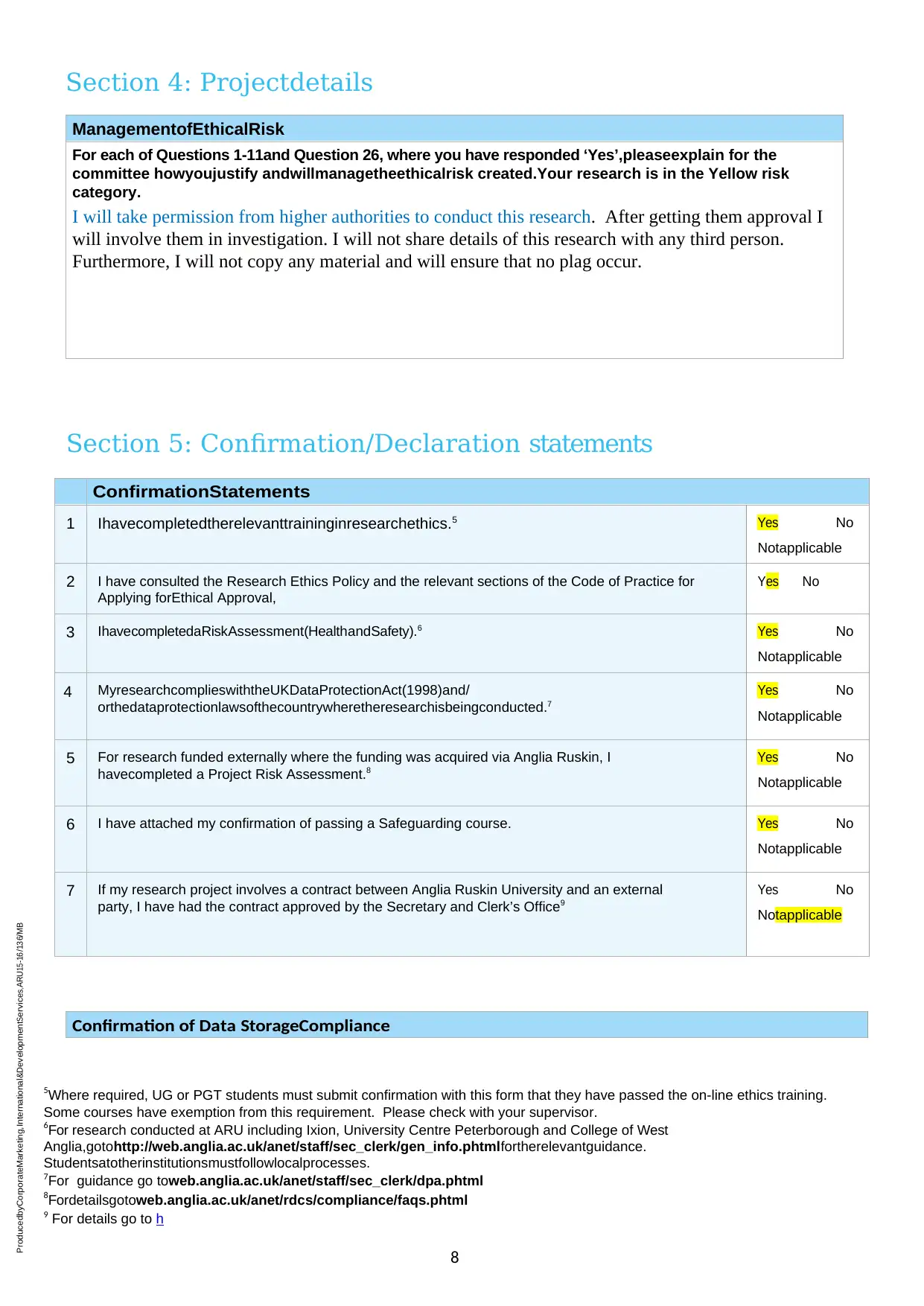
Section 4: Projectdetails
ManagementofEthicalRisk
For each of Questions 1-11and Question 26, where you have responded ‘Yes’,pleaseexplain for the
committee howyoujustify andwillmanagetheethicalrisk created.Your research is in the Yellow risk
category.
I will take permission from higher authorities to conduct this research. After getting them approval I
will involve them in investigation. I will not share details of this research with any third person.
Furthermore, I will not copy any material and will ensure that no plag occur.
Section 5: Confirmation/Declaration statements
ConfirmationStatements
1 Ihavecompletedtherelevanttraininginresearchethics.5 Yes No
Notapplicable
2 I have consulted the Research Ethics Policy and the relevant sections of the Code of Practice for
Applying forEthical Approval,
Yes No
3 IhavecompletedaRiskAssessment(HealthandSafety).6 Yes No
Notapplicable
4 MyresearchcomplieswiththeUKDataProtectionAct(1998)and/
orthedataprotectionlawsofthecountrywheretheresearchisbeingconducted.7
Yes No
Notapplicable
5 For research funded externally where the funding was acquired via Anglia Ruskin, I
havecompleted a Project Risk Assessment.8
Yes No
Notapplicable
6 I have attached my confirmation of passing a Safeguarding course. Yes No
Notapplicable
7 If my research project involves a contract between Anglia Ruskin University and an external
party, I have had the contract approved by the Secretary and Clerk’s Office9
Yes No
Notapplicable
Confirmation of Data StorageCompliance
5Where required, UG or PGT students must submit confirmation with this form that they have passed the on-line ethics training.
Some courses have exemption from this requirement. Please check with your supervisor.
6For research conducted at ARU including Ixion, University Centre Peterborough and College of West
Anglia,gotohttp://web.anglia.ac.uk/anet/staff/sec_clerk/gen_info.phtmlfortherelevantguidance.
Studentsatotherinstitutionsmustfollowlocalprocesses.
7For guidance go toweb.anglia.ac.uk/anet/staff/sec_clerk/dpa.phtml
8Fordetailsgotoweb.anglia.ac.uk/anet/rdcs/compliance/faqs.phtml
9 For details go to h
8
Pr oduc edb y Corpor at e Mark eting, Inter national& De v elopment Ser vic e s ,AR U 15- 16/ 136/MB
ManagementofEthicalRisk
For each of Questions 1-11and Question 26, where you have responded ‘Yes’,pleaseexplain for the
committee howyoujustify andwillmanagetheethicalrisk created.Your research is in the Yellow risk
category.
I will take permission from higher authorities to conduct this research. After getting them approval I
will involve them in investigation. I will not share details of this research with any third person.
Furthermore, I will not copy any material and will ensure that no plag occur.
Section 5: Confirmation/Declaration statements
ConfirmationStatements
1 Ihavecompletedtherelevanttraininginresearchethics.5 Yes No
Notapplicable
2 I have consulted the Research Ethics Policy and the relevant sections of the Code of Practice for
Applying forEthical Approval,
Yes No
3 IhavecompletedaRiskAssessment(HealthandSafety).6 Yes No
Notapplicable
4 MyresearchcomplieswiththeUKDataProtectionAct(1998)and/
orthedataprotectionlawsofthecountrywheretheresearchisbeingconducted.7
Yes No
Notapplicable
5 For research funded externally where the funding was acquired via Anglia Ruskin, I
havecompleted a Project Risk Assessment.8
Yes No
Notapplicable
6 I have attached my confirmation of passing a Safeguarding course. Yes No
Notapplicable
7 If my research project involves a contract between Anglia Ruskin University and an external
party, I have had the contract approved by the Secretary and Clerk’s Office9
Yes No
Notapplicable
Confirmation of Data StorageCompliance
5Where required, UG or PGT students must submit confirmation with this form that they have passed the on-line ethics training.
Some courses have exemption from this requirement. Please check with your supervisor.
6For research conducted at ARU including Ixion, University Centre Peterborough and College of West
Anglia,gotohttp://web.anglia.ac.uk/anet/staff/sec_clerk/gen_info.phtmlfortherelevantguidance.
Studentsatotherinstitutionsmustfollowlocalprocesses.
7For guidance go toweb.anglia.ac.uk/anet/staff/sec_clerk/dpa.phtml
8Fordetailsgotoweb.anglia.ac.uk/anet/rdcs/compliance/faqs.phtml
9 For details go to h
8
Pr oduc edb y Corpor at e Mark eting, Inter national& De v elopment Ser vic e s ,AR U 15- 16/ 136/MB
1 out of 8
Related Documents
Your All-in-One AI-Powered Toolkit for Academic Success.
+13062052269
info@desklib.com
Available 24*7 on WhatsApp / Email
![[object Object]](/_next/static/media/star-bottom.7253800d.svg)
Unlock your academic potential
Copyright © 2020–2026 A2Z Services. All Rights Reserved. Developed and managed by ZUCOL.




